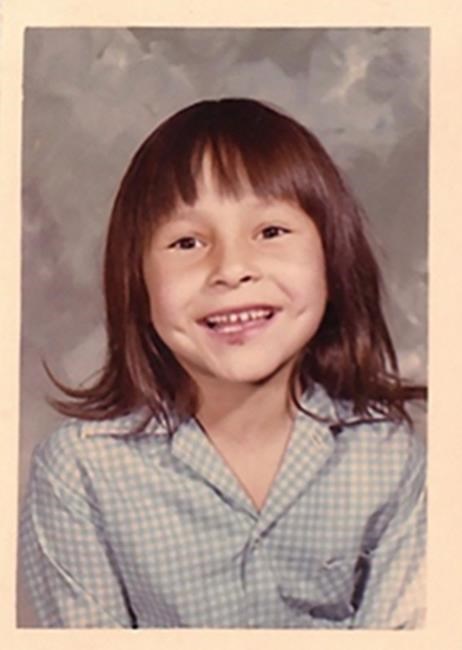
Phyllis Webstad, 6, in the 1973-1974 school year when she attended St. Joseph Mission residential school in Williams Lake, B.C in this handout photo. Politicians in orange shirts attended Orange Shirt Day at the Legislature Thursday for the event in memory of Indigenous children who were forced to go to Canadian residential schools. THE CANADIAN PRESS/HO, Phyllis Webstad *MANDATORY CREDIT*
Republished September 21, 2017 - 5:39 PM
Original Publication Date September 21, 2017 - 3:31 PM
VICTORIA - For years, Phyllis Webstad couldn't wear the colour orange because it reminded her too much of what she endured at residential school in British Columbia.
On Thursday, she was proudly wearing the colour along with dozens of others for her Orange Shirt Day campaign in recognition of the mental and physical harm that thousands of children endured at the schools.
Webstad said as a six-year-old she arrived for her first day at St. Joseph Mission residential school in Williams Lake, B.C., and was told she couldn't wear her new orange shirt.
Her grandmother bought her the shirt; it was bright orange and had a white lace-up front. It made her excited for school, she said.
"When I got to the residential school, which was about two hours away from our reserve at Dog Creek, of course our clothes got taken," Webstad said.
"I never did wear it again," she said.
B.C. politicians of all stripes wore orange shirts during a ceremony at the legislature to remember the thousands of Indigenous children who were forced to go to Canadian residential schools.
She officially set Orange Shirt Day for Sept. 30, marking the start of a new school year, and the time of year when Indigenous children were taken from their homes and sent to residential schools.
Webstad, who is now 50, told the gathering at the legislature she still has a vivid memory of buying the shirt with her grandmother. The colour orange often reminded her of feelings of rejection, but now Orange Shirt Day builds strength for children, she said.
"For me orange had always been a symbol of the feeling of not mattering and nobody caring," she said. "It wasn't until 2013 when I told my orange shirt story that I made the connection of residential schools."
Webstad said she had a baby boy at 13 years of age and at 27, she entered a treatment centre.
"I knew something was wrong," she said. "I didn't know what it was called and I didn't know what to do about it. Now I just hope to bring awareness to get a little justice for us all."
Premier John Horgan attended the event and said he wore an orange shirt to remember the residential school experience for children and ensure the future rights of children are never denied.
"This is a campaign that goes back to the personal experience of a First Nations child, an Indigenous child, who was told she could not wear an orange shirt that her granny had given her," he said. "That's the symbolism that's recognized by these shirts."
Scott Fraser, B.C.'s minister of indigenous relations and reconciliation, said Webstad's story and the goals of Orange Shirt Day "resonates with everybody. It spans politics."
News from © The Canadian Press, 2017